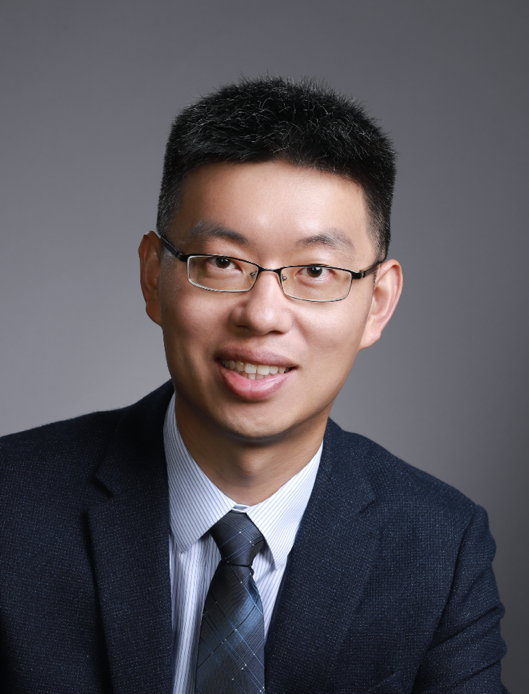Date&time
Time:29th Nov Friday, 2:30-3:30pm, BJT
Location: WDR 1003

Speaker:
Prof. Hanyang Yu

Professor in the College of Engineering and Applied Sciences at Nanjing University
Abstract:
Nucleic acids can fold into distinct tertiary structures with binding affinities and catalytic activities, and thus offer versatile molecular tools to chemistry and biomedicine. However, functional DNAs and RNAs are inherently constrained due to the susceptibility to nuclease degradation and a limited repertoire of chemical functionality. Xeno-nucleic acids (XNAs) are synthetic genetic polymers with superior biological stability and enriched chemical diversity, and provide promising modalities for various biomedical applications.
We primarily focus on threose nucleic acid (TNA), which contains a noncanonical tetrose moiety and is thus refractory to nuclease digestion. We leverage in vitro selection to identify TNA aptamers towards therapeutic target proteins, and catalytic TNAs (TNAzymes) with RNA endonuclease and RNA ligase activities. Specifically, an RNA-cleaving TNAzyme discriminates single point mutation within the substrate, and induces allele-specific gene silencing in living cells. An RNA ligase TNAzyme introduces a noncanonical 2’-5’ phosphodiester linkage in the product, and can thus modulate RNA function. An in vitro selected c-Myc-binding TNA aptamer can be assembled into a heterobifunctional PROTAC to mediate targeted protein degradation. We also develop a chemoenzymatic method to install various chemical groups site-specifically onto DNA, and identify chemically modified DNAzyme variants that exhibit substantially enhanced catalytic activities and reduced metal ion dependence. These results underscore the importance of chemical modification in delivering functional nucleic acids with appealing properties.
核酸能折叠成具有特定的三级结构,拥有结合亲和力和催化活性,因此为化学和生物医学提供了多功能的分子工具。然而,功能性DNA和RNA由于易受核酸酶降解和化学功能性的有限性而固有的受限。异核酸(XNA)是具有优越生物稳定性和丰富化学多样性的合成遗传聚合物,为各种生物医学应用提供了有前景的新方法。
我们的主要研究重点是索糖核酸(TNA),它包含一个非典型的四碳糖基团,因此对核酸酶消化具有抵抗力。我们利用体外筛选技术识别针对治疗性目标蛋白的TNA适体,以及具有RNA内切酶和RNA连接酶活性的催化性TNA(TNA酶)。能够切割RNA的TNA酶可以区分底物中的单点突变,并在活细胞中引发等位基因特异性的基因沉默。另外,RNA连接酶联合TNA酶可以在产物中引入非典型的2′-5’磷酸二酯键,从而能够调节RNA的功能。经体外筛选得到的c-Myc结合TNA适体可以组装成异功能性的PROTAC,用以介导靶向蛋白降解。我们还开发了一种化学酶法,以位点特异性地在DNA上安装各种化学基团,并识别化学修饰的DNA酶变体,这些变体表现出显著增强的催化活性和降低的金属离子依赖性。这些结果突显了化学修饰在提供具有吸引力性质的功能性核酸方面的重要性。
Bio:
Hanyang Yu is a Professor in the College of Engineering and Applied Sciences at Nanjing University. He received his B.S. in Life Sciences from Peking University, and completed his Ph.D. in Biochemistry at Arizona State University under the mentorship of Prof. John Chaput studying in vitro selection of chemically modified nucleic acid aptamers. He then completed his postdoctoral work in the Department of Molecular Biophysics and Biochemistry at Yale University under the guidance of Prof. Dieter Söll before joining the faculty at Nanjing University in 2015. He has published research articles in journals such as Nat. Chem., J. Am. Chem. Soc., and Angew. Chem. Int. Ed. He was awarded the Jiangsu natural science fund for distinguished young scholars in 2023 to support his research on discovering functional xeno-nucleic acid molecules to provide novel chemical biology tools for various biomedical applications. He was also awarded the Chinese Chemical Society Life Chemistry Youth Innovation Award in 2024.
于涵洋教授现任南京大学工程与应用科学学院的教授职位。于教授本科毕业于北京大学生命科学院,后赴亚利桑那州立大学深造,师从约翰·查普特教授并完成其生物化学领域的博士研究。该研究聚焦于化学修饰核酸适体的体外筛选技术。继而在耶鲁大学分子生物物理学与生物化学系展开博士后研究,期间师从迪特尔·索尔教授。2015年,于教授入职南京大学。他的研究成果广泛发表于《自然化学》、《美国化学会杂志》以及《德国应用化学国际版》等重量级学术期刊。
在科研成就方面,于教授于2023年被授予江苏省杰出青年自然科学基金,此基金旨在支持他在发现具有功能性的异核酸分子领域的研究工作,这一领域的探索为各类生物医学应用提供了新颖且具有潜在价值的化学生物学工具。2024年于教授获得中国化学会生命化学青年创新奖。
